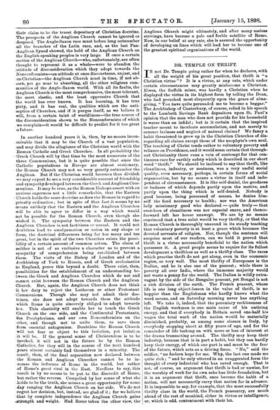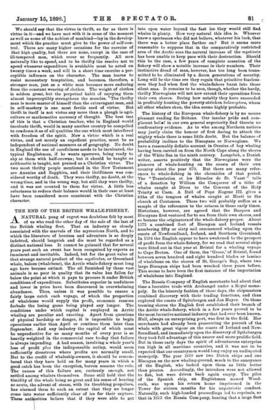DR. TEMPLE ON THRIFT.
IS not Dr. Temple going rather far when he declares, with all the weight of his great position, that thrift is "a Christian virtue "? It is a virtue, at any rate, which under
certain circumstances may greatly misbecome a Christian. Elwes, the Suffolk miser, was hardly a Christian when he displayed the virtue in its highest form by telling the Dean, who had preached most eloquently upon the grace of alms- giving, "You have quite persuaded me to become a beggar." The Archbishop of Canterbury, of course, relied in his speech to the Lambeth Savings Bank depositors upon St. Paul's opinion that the man who does not provide for his household is worse than an infidel ; but is it certain that the inspired teacher meant to inculcate accumulation, and not merely to censure laziness and neglect of natural claims? We fancy a habit threatened to grow up in the Christian Churches of dis- regarding all claims except those of the neophyte's own soul. The teaching of Christ tends rather to voluntary poverty and reliance on Providence, and it would seem certain that through- out Christianity there runs a vein of contempt for that con- tinuous care for earthly safety which is described in our short word "thrift." We should be inclined to say that thrift, like cleanliness, industry, or neatness, was a very useful social quality, even necessary, perhaps, in certain forms of social organisation, but by no means a virtue in itself and inde- pendent of circumstances. It is like self-denial, the goodness or badness of which depends partly upon the motive, and partly upon the thing which is self-denied. Nobody is good because, being possessed of means, he denies him. self the food necessary to health; nor was the American lady missionary good who declared — quite truly — that over-love of cleanliness was her especial snare, and thence- forward left her house upswept. We are by no means convinced that a true saint would be very thrifty, or that the Roman Church is thoroughly unsound in its steady teaching that voluntary poverty is at least a grace which becomes the devoted servants of religion. Nor, though the sentence will surprise most of our readers, can we hold it proved that thrift is a virtue necessarily beneficial to the nation which possesses it. A great people seems to require for its fullest development a thriftless as well as a thrifty class. The races which practise thrift do not get along, even in the economic region, so very well. The most thrifty of Europeans is the Italian, and he is also one of the poorest ; while there is poverty all over India, where the immense majority would not waste a penny for the world. The Italian is wildly extra- vagant by the side of the Bengalee peasant, yet Bengal is not a rich division of the earth. The French peasant, whose life is one long object-lesson in the value of thrift, is no happier than the Englishman who hardly knows what the word means, and on Saturday morning never has anything left. We take it, indeed, that the pecuniary recklessness of the English workman is one main cause of his untiring energy, and that if everybody in Britain saved one-half his wages the total work of the nation would be materially diminished, probably, as among some classes in Italy, by everybody stopping short at fifty years of age, and for the remainder of life looking on with more or less of interest at the drama transacting around. The thrifty may keep their industry, because that is in part a habit, but they can hardly keep their energy, of which one part is and must be the fear of the future, which acts as a driving force. "No," said the soldier, "no forlorn hope for me. Why, the last one made me quite rich ; "and he only uttered in an exaggerated form the thought of every industrial who has saved enough. That is not, of course, an argument that thrift is bad or unwise, for the worship of work for its own sake has little foundation, but it is an argument that thrift, once become the habit of a nation, will not necessarily carry that nation far in advance. It is impossible to say, for example, that the most successfully thrifty class in the world, the French peasantry, are much ahead of the rest of mankind, either in virtue or intelligence, or, which is odd, contentment with their lot.
We should say that the virtue in thrift, so far as there is virtue in it—aad we have met with it in some of the meanest as well as some of the noblest of mankind—lay in the develop- ment which the practice must give to the power of self-con- trol. There are many higher occasions for the exercise of that high quality, but there are none, except in the case of in-tempered men, which recur so frequently. All men naturally like to spend, and to be thrifty the resolve not to spend whenever expenditure is avoidable must be acted on twenty times a week, and will in a short time exercise a per- ceptible influence on the character. The man learns to resist momentary temptation, and becomes, therefore, a stronger man, just as a white man becomes more enduring from the constant wearing of clothes. The weight of clothes is seldom great, but the perpetual habit of carrying them almost imperceptibly strengthens the muscles. `21ata thrifty man is more master of himself than the extravagant man, and in self-mastery is one most fertile seed of virtue. But thrift in itself is not virtue any more than a plough is agri- culture or mathematics accuracy of thought. The best test of this is that a Christian teacher, who in England would inculcate thrift, would in many another country be compelled to condemn it as of all qualities the one which most interfered with freedom of the spirit. Now a virtue which is a real virtue, and not merely an expedient practice, must be as independent of national manners as of geography. No doubt in England the use of carefulness needs to be inculcated, the typical Englishman, if he wants sparrows, being ready to shy at them with half-crowns ; but it should be taught as arithmetic is taught, not praised as a Christian virtue. The two most thrifty people mentioned in the New Testament are Ananias and Sapphira, and their thriftiness was con- sidered worthy of death. They were thrifty, no doubt, at the wrong time, and in the wrong way, but still they were thrifty, and it was not counted to them for virtue. A little less reluctance to reduce their balance would in their case at least have been considered more consistent with the Christian character.



































 Previous page
Previous page